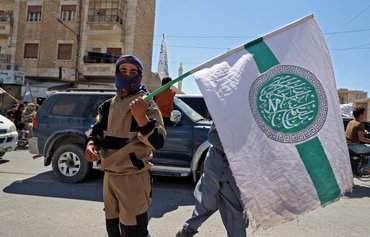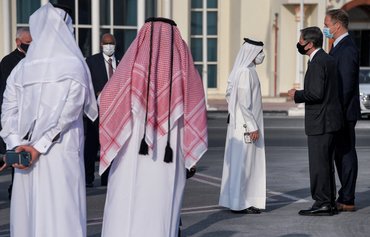Elements within Qatar continue to provide direct financial support to various extremist factions operating in Syria and Iraq, undermining prospects for peace and security in both countries, experts and activists tell Al-Mashareq.
These factions include al-Nusra Front (ANF), which has attempted to rebrand itself as moderate opposition in Syria by renaming itself Fatah al-Sham Front and breaking its ties with al-Qaeda.
Observers say support to groups like ANF undermines the moderate Syrian opposition, the long-term prospects for peace in Syria, and the transition to a representative government that fulfills Syrians’ aspirations for freedom and dignity.
Through his work, Aleppo-based media activist and relief worker Faisal al-Ahmad said Qatar-based individuals have been providing support to a number of Syrian factions, including extremists, since 2011.
Funding is provided to these groups, which include ANF, through relief organisations in opposition-controlled areas, he told Al-Mashareq.
"Many of these foundations and associations are active in Lebanon as well as in Syria, and often camouflage [their activity]", he said.
A number of these groups receive support from individuals based in Qatar, he added, and are in direct communication with these elements to co-ordinate the purchase and transport of weapons, recruitment, salaries and logistical support.
According to Al-Azhar University professor and political researcher Abdul Nabi Bakkar, many Qatar-based individuals and institutions actively support extremist groups fighting in Syria.
Funds funneled through 'charities'
Elements within Qatar "took advantage of the events that have taken place in the region since 2011 to act under the guise of supporting the revolutionaries and revolutions and refugees and the displaced", he told Al-Mashareq.
Armed groups in Syria often are funded under the guise of charities, he said, offering Madad ahl al-Sham as an example of a group that employs this practice.
Madad ahl al-Sham has been able to collect millions since its establishment in 2012, he said, noting that this money has been transferred to Syria and distributed to armed groups operating there.
Egyptian journalist Maher Farghali told Al-Mashareq intelligence and media reports have referred to "meetings held between [ANF leader] Abu Mohammed al-Joulani and some Qatari figures" continuing until 2016.
These culminated in ANF splitting from al-Qaeda and rebranding itself as Fatah al-Sham Front, he said, describing this as an attempt by its Qatari backers to give the impression that ANF and its allies were part of the moderate opposition.
But in October of last year, ANF announced that Jund al-Aqsa, a radical group with its own ties to al-Qaeda, would be joining its ranks.
Later, on January 28th, ANF and four opposition factions announced they had formed a new alliance called Tahrir al-Sham (Liberation of Syria), which comprises members that embrace the ideology of former al-Qaeda leaders Osama bin Laden and Abu Musab al-Zarqawi.
Qataris accused of terror financing
Organisations and individuals in the Middle East are not alone in their claims of Qatar-based funding of extremist groups.
In 2013, the US Department of the Treasury named Qatar-based Abd al-Rahman bin Umayr al-Nuaymi as a "specially designated global terrorist" for his support of al-Qaeda. In 2014, the UN added him to the al-Qaeda Sanctions Committee list.
According to the Treasury, al-Nuaymi ordered the transfer of nearly $600,000 to al-Qaeda via the group's representative in Syria, Abu-Khalid al-Suri, and had intended to transfer nearly $50,000 more.
Al-Nuaymi also had facilitated significant financial support to al-Qaeda in Iraq, reportedly overseeing the transfer of over $2 million per month to that group for a period of time, the Treasury said.
Al-Nuaymi also served as an interlocutor between leaders of al-Qaeda in Iraq and Qatar-based donors, according to the Treasury.
In 2015, the US Treasury imposed sanctions on Saad bin Saad Muhammad Shariyan al-Kaabi, a Qatari financier of ANF, and also on Qatari al-Qaeda facilitator Abd al-Latif Bin Abdallah Salih Muhammad al-Kawari.
Both have been named as "specially designated global terrorists".
"These sanctions target two major facilitators of ANF and al-Qaeda," said Acting Under Secretary for Terrorism and Financial Intelligence Adam J. Szubin. "Treasury remains committed to using our financial intelligence and authorities to unravel and disrupt the funding schemes exploited by terrorist groups."
Donation campaigns in Qatar
As of early 2014, al-Kaabi reported he had set up donation campaigns in Qatar to aid with fundraising in response to a request from an ANF associate for money to purchase both weapons and food, the Treasury said.
In that same time period, an ANF official requested that al-Kaabi act as an intermediary for collecting a ransom for a hostage being held by ANF, and he worked to facilitate a ransom payment in exchange for the release of a hostage.
Since at least late 2012, al-Kaabi has provided support to ANF in Syria.
Al-Kawari also has collected financial support for al-Qaeda, the Treasury said.
In early 2012, he worked with al-Qaeda to co-ordinate the delivery of funding from Qatari financiers intended to support al-Qaeda and to deliver receipts confirming that al-Qaeda had received funding from Qatar-based extremists.
Early the same year, he also facilitated the international travel of a courier who was carrying tens of thousands of dollars earmarked for al-Qaeda.
In the early 2000s, al-Kawari worked with al-Qaeda operative Mustafa Hajji Muhammad Khan, also known as Hassan Ghul, and Qatari al-Qaeda facilitator Ibrahim Isa Haji Muhammad al-Bakr to transfer money to al-Qaeda in Pakistan.
At that time, al-Kawari also obtained a fraudulent passport for Ghul, which the latter used to travel to Qatar with al-Kawari and al-Bakr.

![Al-Nusra Front elements in al-Qaboun neighbourhood in Damascus before they withdrew to Idlib in the second week of May. [Photo courtesy of Mohammed al-Abdullah]](/cnmi_am/images/2017/05/15/7904-syria-anf-figters-600_384.jpg)






